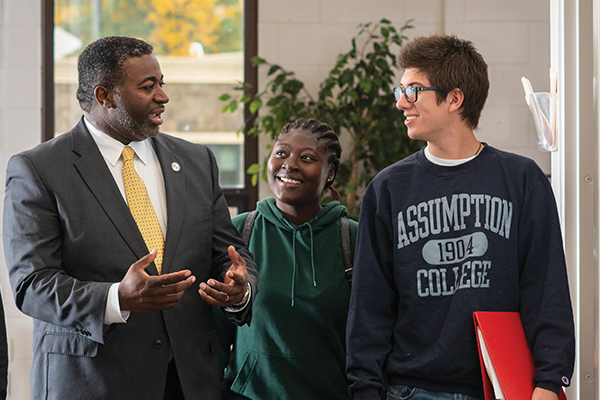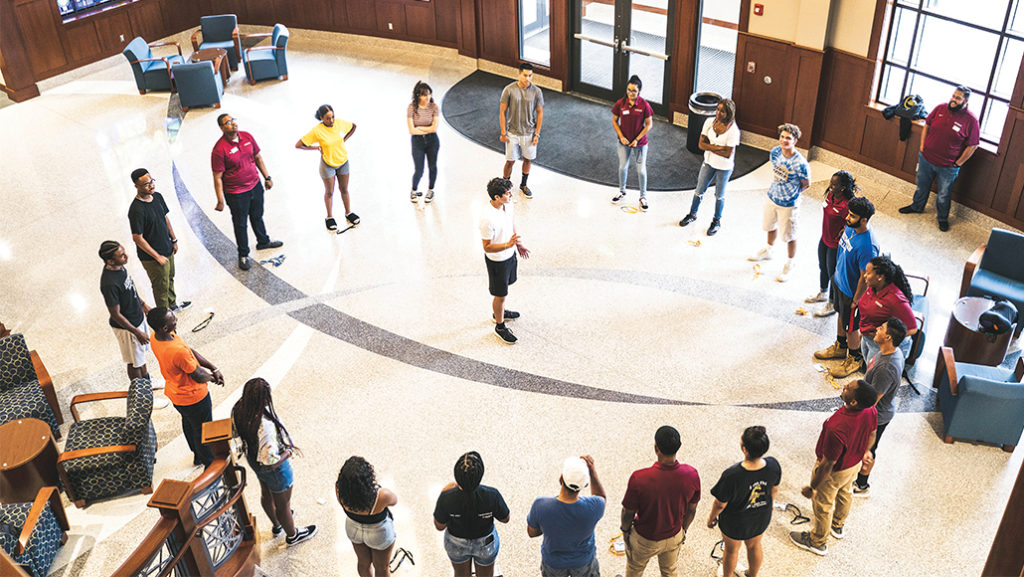 What does it mean to be a successful student? That depends on who you ask. For Conway Campbell, Sr., Ed.D., vice president of the College’s newly created Division for Student Success, it’s about a lot more than academic achievement.
What does it mean to be a successful student? That depends on who you ask. For Conway Campbell, Sr., Ed.D., vice president of the College’s newly created Division for Student Success, it’s about a lot more than academic achievement.
“To be truly successful, our students must understand why they’re here at Assumption – to know not just why they enrolled in college, but what their purpose in life is,” he said. “Through their time with us, we hope they’ll realize their purpose and develop the tools and skills they need to be able to fulfill it after graduation.”
In the field of higher education, “student success” is defined as the institution’s ability to retain students from first year to graduation. Retention and graduation statistics vary widely nationwide, but by all accounts, Assumption is doing better than most institutions. According to a recent U.S. News & World Report study, the national average retention rate for 2016 was about 61 percent. (In other words 61 percent of freshmen returned to their schools for sophomore year.) At Assumption, the retention rate was 84.5 percent last year – well above that national average.
“Sure, that’s pretty good,” said Campbell, “but we still don’t feel like that’s good enough. We have an ethical responsibility to help more students continue through the institution to reach their goals.”
The College’s graduation rate is also impressive. The federal government mandates that any institution of higher education that receives federal student aid dollars must report the percentage of full-time students who graduate within six years. According to the National Center for Education Statistics, the national average for full-time students graduating within six years hovered at around 60 percent, while Assumption’s graduation rate was 72 percent in 2018. That’s a better graduation rate than most, said Campbell, “but that’s a number we’d like to see improve even more. That’s what the Division for Student Success is all about: inspiring a collectively integrated, intentional, and systematic approach to success for all students.”
A Human Capital Campaign
President Francesco C. Cesareo, Ph.D., who originally conceived of establishing this new division and approached Campbell about heading it last fall, says the Division for Student Success supports the very heart of Assumption’s mission, which is “to prepare young men and women to lead successful, meaningful, purposeful lives. The only way that can happen is if they have positive experiences at Assumption and successful college careers. It is critical that we identify issues that could impede the ability of a student to succeed and address them as early as possible.”
As he sees it, “everything is about student success, and any obstacle that gets in the way of that needs to be dealt with quickly.” Those obstacles run the gamut from academic struggles to issues with roommates, organization, or financing college.
Kashmir Flood ’20 knows this scenario all too well. A sociology major who attended a magnet school in Hartford, CT, Flood was raised by a single mother who was enrolled part-time in college classes.
“There would be times when she’d have to skip a semester to make sure she could support our family,” Flood said, “while other times I’d come home, have dinner, then sit down and do homework with her at the dining room table. I don’t know how she did it, but she did.”
Flood, who just completed an internship with the Worcester District Attorney’s office and hopes to attend law school, said that some of the biggest hurdles to succeeding in college “are definitely financial. It’s important for institutions to have conversations with students about how to manage financial aid so they can afford school.”
In addition, she sees many students, especially those whose high schools or families didn’t prepare them academically, struggling to make the adjustment to college-level studies. “In college, things are more fast-paced and you have to learn more independently. At the same time, you’re adjusting socially and struggling to make friends and figure out what you want to do, so it can be pretty stressful.”
Assumption’s population is more diverse than ever, and many of these students are the first in their families to attend college. Due to shifting demographics across the Northeast and a commitment to recruit a more diverse student population, students of color now make up 20 percent of the College’s enrollment – up from only five percent just 15 years ago.
That growing diversity in the student population, in particular first-generation students, means that the College must provide more services, said Campbell. “We have to pay attention to those who might need more support to get them through.”
“To help students be successful, we want to encourage them to be sponges, to take advantage of as many opportunities as they can and find a balance between academics and a social life,” said Cedric Ellis ’84, executive vice president and chief enterprise services officer of CUNA Mutual Group in Madison, WI, during a visit with ALANA students at their pre-orientation in August.
Ellis, who funded the three-day pre-orientation program that provided students with time to connect with faculty, administrators, and fellow students, said, “We emphasize the importance of an education as a means of giving them the opportunity to go many places in life and open many doors.” In essence, added President Cesareo, “This Division was put together as we looked at what’s happening with students when they arrive here, what challenges they experience, and how we can help them overcome those challenges so that our students persist through graduation. The College was doing a lot in the area of retention already, but it was decentralized. Equally important, we are focusing on student success from an institutional perspective rather than a divisional perspective.” Because there were different offices focusing on different aspects of student success instead of a more coordinated, intentional, systematic effort, “that led to some students falling through the cracks. By bringing all of these efforts together under a vice president to oversee and centralize all efforts that relate to student success, we’ll be able to address issues much earlier, allowing us to intervene and help students overcome obstacles they may be experiencing.” Bottom line? “We’re a school that should have a retention rate of 90 percent,” he said. “The Division will focus on efforts to achieve that benchmark.”
 The Four Pillars of Success
The Four Pillars of Success
The Division for Student Success is building on four pillars that are key to helping every student succeed: retention, persistence, graduation, and employability. The Division’s goal is to make student success a unified, campus-wide endeavor across all departments. To accomplish this, the Division physically combines certain offices, like the Center for Purpose and Vocation and the D’Amour Center
for Teaching Excellence (DCTE), which draws faculty members into the effort. The Division also includes the Cross-Cultural Center, which helps connect various campus areas around race and ethnic diversity issues, and the Career Development and Internship Center, which reaches out to students with help in finding internships, writing resumes, identifying experiential learning opportunities, and locating jobs. How is this work being carried out on a practical, day-to-day basis?
Recently, the DCTE brought 50 faculty members and staff together to discuss a book, The Stressed Years of Their Lives: Helping Your Kid Survive and Thrive During the College Years. Participants brainstormed ideas about how to address students’ mental health needs, and a panel of experts put together by the DCTE – including Assistant Professor of Psychology Adam Volingus, Ph.D., and Julie LeBlanc, director of Accessibility Services – responded with resources and information.
The next morning, Campbell received an email from a staff member who had attended the DCTE event, saying that she was concerned about a particular student. “We were then able to talk about what we were each noticing about that student and how to help him. If we can get other people thinking, ‘Wait, I’ve noticed something seems off with a certain student, and I’m going to say something,’ we can intervene sooner when students need help.”
The DCTE is naturally allied with the Division for Student Success, said Professor of English James Lang, Ph.D., who directs the Center. “We have the same goal of helping students succeed, but our focus is on how the faculty can play a role in that success.”
He sees a rising number of students who have challenges with learning differences and mental health issues, which means faculty members need a better awareness of those specific issues and how to address them. The increase in the number of international and first-generation students also means that the faculty must be aware that they come in with different assets and needs.
A few decades ago, the faculty focused primarily on teaching content, he added, whereas “today we’re more aware that we can help students succeed beyond learning our specific subject matter. “Knowledge fields change,” Prof. Lang continued.
“We have to help students develop the skills, knowledge, confidence, and desire to learn beyond their individual classes and degrees, as well as how to be effective communicators and how to manage multiple projects and deadlines.
Fostering a Sense of Belonging
After growing up in Monterrey, Mexico, and having the opportunity to attend a liberal arts college in Minnesota, Professor of Spanish Esteban Loustaunau, Ph.D., has a firsthand appreciation of how good mentors can help students navigate the rigor and complexities of new cultural and academic environments.
“Building purposeful lives with a strong sense of meaning and belonging is another way in which the Division for Student Success supports Assumption students,” said Prof. Loustaunau, director of the Center for Purpose and Vocation and the SOPHIA Program.
Prof. Loustaunau believes that fostering a sense of belonging is the most important factor in supporting student success.
“It really comes down to building personal relationships,” he said. “To be successful, students need to connect with mentors. It could be a staff member, a professor, or an older student. Anybody who believes in them.” Having those mentors allows students to manage better as their friendships and living situations change, when they choose a major, or if they’re struggling in a class.
Students often arrive on campus the first year “wearing someone else’s face,” Prof. Loustaunau added. “A good college education need to encourage students to examine their own lives and find their true selves, so that they can better understand the kind of life they ought to live.”
Student Government Association President Colin McQuillan ’20 had a similar experience. “I had no clue what I wanted to do when I came to Assumption,” he said. He ended up in marketing, and has held various student government roles during his four years here. “My biggest goal has always been to ensure that other students can feel the same way I’ve felt here,” he said, “which is that Assumption has changed me for the better.” Now McQuillan tries to do the same for other students. For instance, when his roommate was feeling undirected at Assumption and thinking of transferring, McQuillan “pushed him to join student government, and he found his place.”
For many students, especially those who are the first in their families to attend college, there is a great deal of pressure. “They think they aren’t only getting an education for themselves, but for their entire families,” Prof. Loustaunau said, “because they feel theirfamilies are depending on them to climb the ladder of success. Part of what I do is help them see that you shouldn’t pick only from careers that pay the best, but from careers that will make you feel engaged and satisfied. That’s a measure of true success.”


